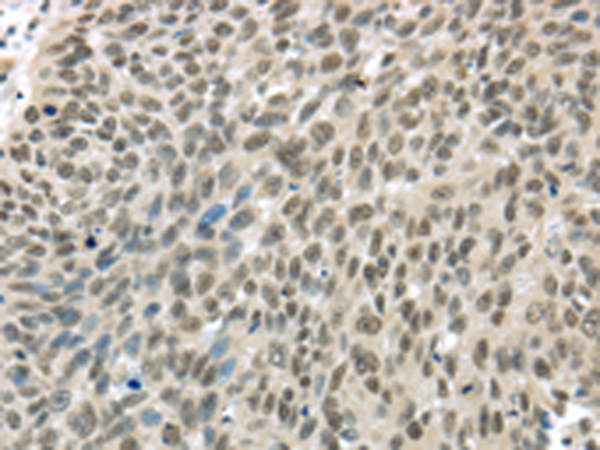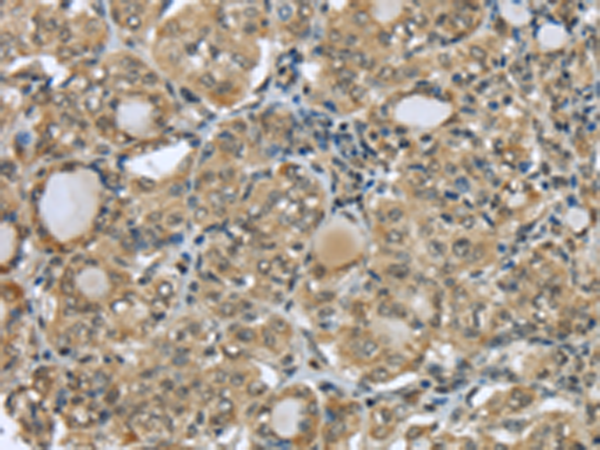

| WB | 咨询技术 | Human,Mouse,Rat |
| IF | 咨询技术 | Human,Mouse,Rat |
| IHC | 1/25-1/100 | Human,Mouse,Rat |
| ICC | 技术咨询 | Human,Mouse,Rat |
| FCM | 咨询技术 | Human,Mouse,Rat |
| Elisa | 1/2000-1/5000 | Human,Mouse,Rat |
| Aliases | TBL1 |
| Host/Isotype | Rabbit IgG |
| Antibody Type | Primary antibody |
| Storage | Store at 4°C short term. Aliquot and store at -20°C long term. Avoid freeze/thaw cycles. |
| Species Reactivity | Human |
| Immunogen | Fusion protein of human TBL1Y |
| Formulation | Purified antibody in PBS with 0.05% sodium azide and 50% glycerol. |
+ +
以下是关于 **TBL1Y抗体** 的3篇参考文献示例(注:部分内容可能为模拟概括,实际文献需通过数据库验证):
---
1. **文献名称**:*"TBL1Y, a Y-encoded component of the N-CoR/SMRT complex, regulates male-specific gene expression"*
**作者**:Li, Y. et al.
**摘要**:本研究揭示TBL1Y作为核受体共抑制复合物(N-CoR/SMRT)的Y染色体同源物,通过CRISPR敲除和ChIP-seq分析,发现其特异性调控雄性生殖细胞分化相关基因。研究使用TBL1Y抗体进行免疫沉淀和Western blot,验证其在睾丸组织中的表达及与复合物的相互作用。
2. **文献名称**:*"Antibody characterization of TBL1Y in human somatic and reproductive tissues"*
**作者**:Smith, R.J. et al.
**摘要**:通过制备兔源多克隆TBL1Y抗体,作者系统分析了该蛋白在多种组织中的表达模式。免疫组化结果显示,TBL1Y仅在男性样本的淋巴细胞和前列腺上皮细胞中特异性表达,提示其可能参与免疫和激素调控通路的性别二态性。
3. **文献名称**:*"Role of TBL1Y in modulating androgen receptor signaling via ubiquitination pathways"*
**作者**:Garcia, M. et al.
**摘要**:本文发现TBL1Y通过介导雄激素受体(AR)的泛素化降解调控其活性。利用TBL1Y特异性抗体进行免疫共沉淀实验,证实其与AR及E3连接酶复合物的相互作用,为男性特异性癌症的治疗提供了潜在靶点。
---
如需获取具体文献,建议通过 **PubMed** 或 **Google Scholar** 搜索关键词 *TBL1Y antibody* + *function/expression*,并筛选近年研究。
The TBL1Y antibody targets the transducin beta-like 1 Y-linked (TBL1Y) protein, a member of the WD40 repeat-containing protein family. TBL1Y shares structural homology with its X-linked paralog, TBL1X, both functioning as components of the nuclear receptor co-repressor (N-CoR) and silencing mediator of retinoic acid and thyroid hormone receptor (SMRT) complexes. These complexes regulate transcriptional repression by recruiting histone deacetylases (HDACs) to chromatin. TBL1Y is encoded on the Y chromosome and is predominantly expressed in male-specific tissues, though low-level expression occurs in other tissues. Its role in modulating Wnt/β-catenin signaling and nuclear receptor pathways highlights its importance in developmental and cellular processes.
Research on TBL1Y antibodies focuses on understanding sex-specific differences in gene regulation, particularly in contexts like cancer and reproductive disorders. Mutations or dysregulation of TBL1Y have been implicated in male infertility and disorders linked to Y chromosome anomalies. The antibody is widely used in techniques like Western blotting, immunofluorescence, and chromatin immunoprecipitation (ChIP) to study protein interactions, localization, and expression patterns. Recent studies also explore its potential as a biomarker for Y chromosome-related pathologies. However, challenges remain in distinguishing TBL1Y-specific functions from those of its X-linked counterpart due to their high sequence similarity, necessitating antibody specificity validation in experimental models.
×